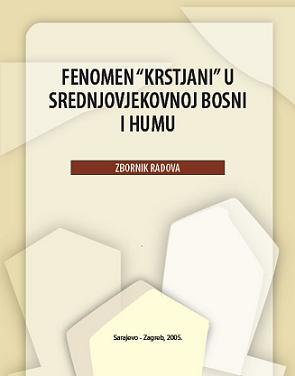Nekoliko primjera nacionalnog i političkoga posvajanja Crkve bosanske u srpsko/srbijanskoj i muslimansko/bošnjačkoj historiografiji (i publicistici) XIX. I XX. stoljeća
A few examples of national and political adoption of the Church of Bosnia in Serb / Serbian and Muslim / Bosniak historiography (and publicist writing) in XIX. I XX. Century
From petranović to internet
Author(s): Zlatko Matijević
Subject(s): History, Recent History (1900 till today), Special Historiographies:, Theology and Religion, 13th to 14th Centuries, 15th Century, 19th Century, Historical revisionism
Published by: Institut za istoriju
Summary/Abstract: The Church of Bosnia as a historiographic subject appears at the beginning of the second half of the 19th century. There are hundreds of bibliographic units that deal with solving the problem of origins, creation, activities and dissappearance of this religious medieval sect.
Serbian historiography, following the lead of an attorney at law from Zadar, Božidar Petranović, cleaves to the premise that the Church of Bosnia was - Orthodox. The final consequence of this highly disputable claim is setting “scientific grounds” for the great Serbian appropriation of Bosnia and Herzegovina as “pure” Serbian territories in both national and political sense.
The assertion made by Franjo Rački, the first president of the Yugoslavian Academy of Art and Science, that the adherents of the Church of Bosnia were, in fact, dualist heretics of Bogomil provenance that in great numbers subscribed to Islam after the demise of the Medieval Bosnian state and reinstatement of Ottoman rule, was especially appealing in certain Muslim/Bosniak circles.
Mass computerization and the emergence of the Internet enabled the adherents to the Church of Bosnia with contemporary means of recycling old theses on religious, national and political affiliation of the adherents of the Church of Bosnia.
In order to avoid the tendentious claims about the identity of the Church of Bosnia, it is crucial for contemporary historiography to turn to authentic historical resources as the only reliable foundation for scientifically grounded answers to numerous questions on the origin, existence and demise of this religious community.
Book: Fenomen "Krstjani" u srednjovjekovnoj Bosni i Humu
- Page Range: 335-350
- Page Count: 16
- Publication Year: 2005
- Language: Croatian
- Content File-PDF

